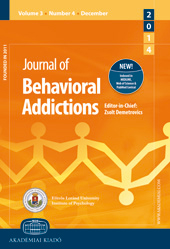Gambling with Rose-Tinted Glasses on: Use of Emotion-Regulation Strategies Correlates with Dysfunctional Cognitions in Gambling Disorder Patients
Gambling with Rose-Tinted Glasses on: Use of Emotion-Regulation Strategies Correlates with Dysfunctional Cognitions in Gambling Disorder Patients
Author(s): Juan F. Navas, Antonio Verdejo-García, Marta López-Gómez, Antonio Maldonado, José C. PeralesSubject(s): Cognitive Psychology, Clinical psychology, Behaviorism, Substance abuse and addiction
Published by: Akadémiai Kiadó
Keywords: gambling disorder; cognitive biases; emotion regulation; gambling-related cognitions; metacognition;
Summary/Abstract: Existing research shows that gambling disorder patients (GDPs) process gambling outcomes abnormally when compared against healthy controls (HCs). These anomalies present the form of exaggerated or distorted beliefs regarding the expected utility of outcomes and one’s ability to predict or control gains and losses, as well as retrospective reinterpretations of what caused them. This study explores the possibility that the emotional regulation strategies GDPs use to cope with aversive events are linked to these cognitions. Methods: 41 GDPs and 45 HCs, matched in sociodemographic variables, were assessed in gambling severity, emotion-regulation strategies (cognitive emotion-regulation questionnaire, CERQ), and gambling-related cognitions (gambling-related cognitions scale, GRCS). Results: GDPs showed higher scores in all gambling-related cognition dimensions. Regarding emotion regulation, GDPs were observed to use self-blame and catastrophizing, but also positive refocusing, more often than controls. Additionally, in GDPs, putatively adaptive CERQ strategies shared a significant portion of variance with South Oaks gambling screen severity and GRCS beliefs. Shared variability was mostly attributable to the roles of refocusing on planning and putting into perspective at positively predicting severity and the interpretative bias (GDPs propensity to reframe losses in a more benign way), respectively. Discussion and conclusions: Results show links between emotion-regulation strategies and problematic gambling-related behaviors and cognitions. The pattern of those links supports the idea that GDPs use emotion-regulation strategies, customarily regarded as adaptive, to cope with negative emotions, so that the motivational and cognitive processing of gambling outcomes becomes less effective in shaping gambling-related behavior.
Journal: Journal of Behavioral Addictions
- Issue Year: 5/2016
- Issue No: 2
- Page Range: 271-281
- Page Count: 11
- Language: English

